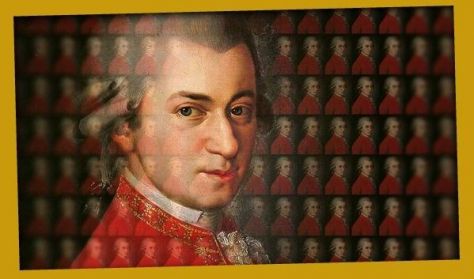
Mozart Day - 5
Mozart: Cassation in G major, K. 63
Mozart: Adagio and Fugue, C minor, K. 546
Mozart: Piano Concerto No. 16 in D major, K. 451
more

Mozart: Cassation in G major, K. 63
Mozart: Adagio and Fugue, C minor, K. 546
Mozart: Piano Concerto No. 16 in D major, K. 451
more
Ön egy múltbeli eseményre keresett rá. Kérjük, válogasson aktuális kínálatunkból a Jegy.hu keresőjében!
Last event date: Sunday, March 10 2019 4:00PM
4 pm Grand Hall – Mozart Day - 5
Mozart: Cassation in G major, K. 63
Mozart: Adagio and Fugue, C minor, K. 546
Mozart: Piano Concerto No. 16 in D major, K. 451
Featuring: Ferenc Rados
Concerto Budapest
Concertmaster: Arvid Engegård
Wolfgang Amadeus Mozart: Cassation in G major, K. 63
Cassation (the name was primarily used in southern Germany) is a serenade-type genre mostly for outdoor performance. Its first movement is generally a march, there is no fixed number of movements and typically two minuets (as we see with Mozart). The Cassation in G major dates from summer 1769 along with two other cassations.
Wolfgang Amadeus Mozart: Adagio and Fugue, C minor, K. 546
Baron Gottfried van Swieten, one of Mozart’s most important patrons in Vienna, served in Berlin as imperial ambassador in the 1770s. Here he came into contact with music circles particular attracted to the greats of the past, for example, Händel and Bach. From 1782, Mozart was a regular guest of Swieten, he studied the baron’s collection of sheet music, wrote arrangements of several works, and made the high-level fugue technique a natural part of his own style. In late 1783, he wrote a fugue for two pianos (K. 426) – it is not known whether there was a specific reason for the work, or it was commissioned. The theme of the composition in C minor is a typical Baroque fugue; we can find several variations of it in pieces by Bach and Händel as well as several ‘archaic’ works by Haydn (for example, in the fugue finale of the 1772 String Quartet in F minor). Mozart himself took advantage of the compositional opportunities inherent in the theme type in several of his works, the last one being in the Kyrie fugue of Requiem in 1791. In 1788, he went back to the Fugue in C minor for double piano and rearranged it for string quartet, plus he composed a dignified, dramatic prelude (overture) for it. It was published in this form.
Wolfgang Amadeus Mozart: Piano Concerto No. 16 in D major, K. 451
Mozart composed the Piano Concerto in D major for himself, for his academy (composer’s recital) in summer 1784. The bright, generously orchestrated piece – especially as regards the wind instruments – is eloquent testimony to the exceptional tonal imagination of the composer. After the concert organized in the Burgtheater, he wrote proudly to his father: “The theatre concert was a big success. If only you could have heard it!”
Musicalvígjáték a félreértésekről és a válságon győzedelmeskedő szerelemről, melynek zenéjét a legnépszerűbb magyar előadók dalaiból válogattuk össze. Nyolc ember mulatságos és megható találkozása az online térben a pandémia idején. Sorsuk megváltozásához elég egy téves hívás, egy lelkisegély-szolgálat felkeresése vagy akár egy ételrendelés.
1905. Elárverezik a párizsi Operaház teljes hajdani berendezéseit. Többek között egy csillárt, amely a kikiáltó szerint egy máig sem tisztázott baleset okozója volt. A baleset tetteseként az Operaház titokzatos Fantomját emlegették.
Déry Tibor – Pós Sándor – Presser Gábor – Adamis Anna: KÉPZELT RIPORT EGY AMERIKAI POPFESZTIVÁLRÓL musical - turné
A Liszt Ferenc-, Artisjus és Junior Prima díjas zongoraművész, Fülei Balázs "De Profundis" koncertjén Chopin, Beethoven, Bartók, Messaiaen és Liszt…
December eljövetele nemcsak a tartós hideg beköszöntét jelenti, hanem az ünnepi fényekbe öltöztetett utcákat, a karácsonyi vásárok forgatagát és a…
Budapest, 2025. április 12. – A magyar rap színtér egyik meghatározó alakja, Pogány Induló nagyszabású koncerttel tér vissza, ezúttal a…
item(s) in basket
total:
Time limit has expired. Please, put item(s) in to basket again.